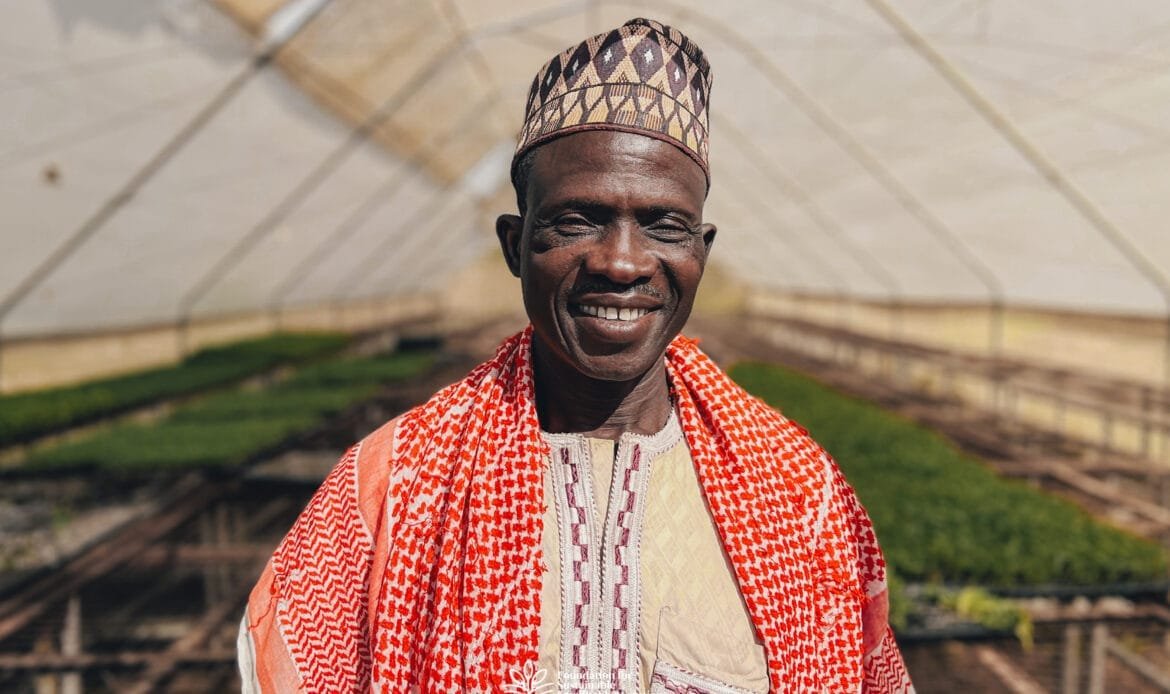The challenges of smallholder farming are all too familiar across Nigerian communities. In the rural community of Juwan Tudu, these challenges persist—limited access to quality inputs, poor knowledge of improved agricultural practices, and a lack of markets to sell produce. But today, this same community, nestled in Birnin Kudu LGA, Jigawa State, is witnessing a quiet, but evidential change in the face of agriculture, led by one of its own: Sabo Sagiru, Farmers’ Hub Manager and agricultural trailblazer.
Through the support of the Foundation for Sustainable Smallholder Solutions (FSSS), Sabo has gone from being a small-scale farmer to a respected leader supporting over 12,000 farmers in his region. His story is not just one of personal growth, but of a community empowered by knowledge, access, and opportunity.
“This Hub has helped me greatly,” Sabo says. “Before now, I was just managing small plots. But with the training, resources, and exposure I received through the Foundation, I am now farming on a much larger scale. I’ve become a leader in our local farmers’ association. This kind of progress was unthinkable before.”
A Hub that Does More Than Sell
The Farmers’ Hub at Juwan Tudu is more than a point of sale. It’s a knowledge centre, demonstration site, and community gathering space rolled into one. Managed by Sabo, it offers farmers access to a wide range of improved seeds and seedlings—many of which were previously unknown in the area.
“We sell and grow improved varieties like The Chibli, Kilele, Platinum, Diva and even local favourites like Inca,” he explains. “We also plant and sell sweet melon, green pepper, red pepper, and more. Farmers come here not just to buy, but to learn and see what’s working.”


Many of these seeds are grown directly at the Hub in greenhouses or demo plots. Farmers see how the crops perform under local conditions before making decisions—helping them move away from trial-and-error farming toward data-driven choices.
“Some farmers even give me money to buy seeds on their behalf. I raise the seedlings, take care of them, and they pay for the labour. It’s trust built over time—and because they now understand the value of improved varieties,” Sabo says.
Building Knowledge Through Demonstrations and Training
Education is central to the Hub’s mission. One of the most impactful tools Sabo uses is the demonstration plot, where farmers can compare the performance of traditional and improved seed varieties under the same conditions.
“We organise different types of demos—sometimes basic ones just to get their attention. Once they see how well the improved variety is doing, they become eager to learn more,” he shares.
The Hub also hosts regular farmer training sessions, where topics like seed selection, pest management, greenhouse management, and good agronomic practices are taught. These sessions are often hands-on, allowing farmers to touch, see, and ask questions in real time.
“At first, many farmers didn’t even know there were different types of tomato seeds, let alone how to choose the right one. Now, they come to training sessions regularly. They want to know more. They ask questions. It’s encouraging to see that shift,” he adds.

Tomatoes That Tell a Story
Tomatoes are a major crop for Sabo—and each variety tells a different story. He walks visitors through the greenhouse, proudly pointing to rows of vibrant seedlings.
“This one is Platinum,” he says, crouching next to a batch of seedlings. “We sprayed it on 6 November 2024, and now, 30 days later, it’s ready to be transplanted.”
He moves over to another section. “This is The Chibli tomato. It’s very good for cooking. With Chibli, you only need three tomatoes to make a stew that would usually take seven local ones.”
Then, he explains the value of diversity: “We also plant Inca and Diva. Inca is a local favourite—it’s soft and tasty, but not good for long-distance transport. Diva, on the other hand, has thick skin, it travels well, and buyers love its bright red colour.”
From One to Thousands: Expanding His Reach
One of the most remarkable outcomes of Sabo’s leadership is the exponential growth in farmer outreach. What started with 3,000 farmers has now grown to over 12,000—thanks to the consistent engagement, trust, and proven results from his work at the Hub.
“The Foundation helped me, and through me, they’ve helped thousands more,” he says. “What we’re doing here is not just selling seeds. We’re changing mindsets. We’re empowering people.”
A Word of Gratitude
The transformation in Juwan Tudu would not have been possible without the backing of the Foundation for Sustainable Smallholder Solutions. For Sabo, the support goes beyond technical training—it’s a pathway to dignity, growth, and service to others.

“I want to thank the Foundation from the bottom of my heart. They’ve helped me immensely. May God continue to bless them, because they’ve not just helped me—they’ve helped my community,” he says emotionally.
The Juwan Tudu Farmers’ Hub is a model for what’s possible when local leadership is paired with the right kind of support. It is a space of trust, learning, commerce, and hope. And at the centre of it all is Sabo Sagiru—a man who started with a handful of seeds and a vision, and is now cultivating a future for thousands.


